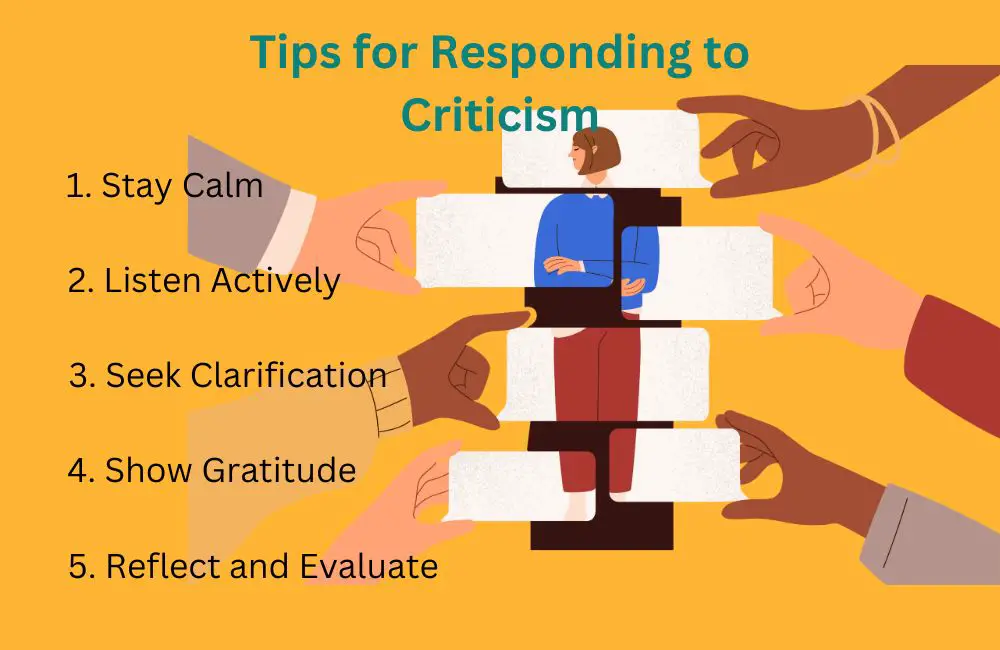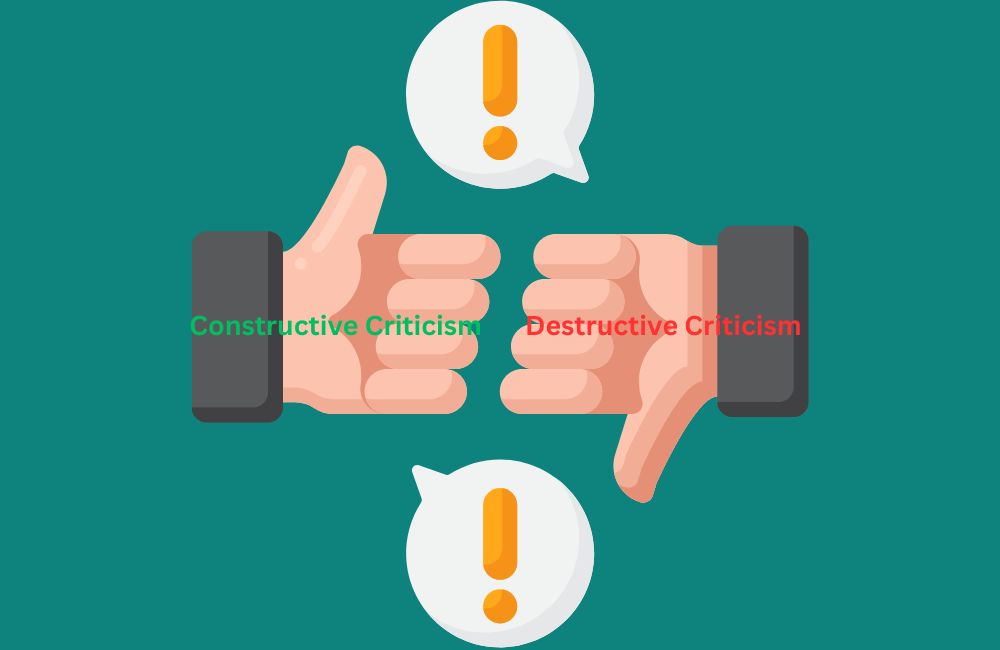Criticism is inevitable in personal and professional interactions as we journey through life. Whether you are learning a new language or mastering a skill, criticism can serve as a tool for personal growth and improvement. In this post, I’ll explain how to handle criticism gracefully and respond politely in English.
When responding to criticism in English, stay calm, actively listen, seek clarity, express gratitude, and reflect. Start with expressions like “I appreciate your feedback” or “I understand your point” to maintain professionalism and openness while responding to criticism.
Are you looking for a book or a guide to help you learn and improve your English? You may try English Made Easy Volume One: A New ESL Approach: Learning English Through Pictures (Amazon Link).
Continue reading the post for detailed insights on how to respond to criticism. The subsequent sections offer a rich collection of English expressions for responding to criticism, concrete examples of handling constructive and destructive criticism, and practical tips for enhancing your communication skills.
Table of Contents
- What Is The Role of Criticism in Personal and Professional Development?
- Constructive versus Destructive Criticism
- 30+ General English Phrases/Expressions for Responding to Criticism
- 10 Examples of Respond to Constructive Criticism
- 10 Examples of Respond to Destructive Criticism
- Practical Tips for Gracefully Responding to Criticism
- Sample Conversation: Politely Responding to Criticism in English
- In Conclusion
- 10 Frequently Asked Questions Related to Politely Responding to Criticism in English
What Is The Role of Criticism in Personal and Professional Development?
At its core, criticism is a mechanism for growth. It plays a fundamental role in our personal and professional lives as a mirror reflecting our actions, behavior, and performance. When provided with honesty and good intention, criticism serves as a roadmap, guiding us toward improvement and helping us to avoid repeated mistakes.
It gives us an opportunity to assess our skills, challenge our limits, and fuel our determination for betterment. Criticism often acts as the catalyst that drives change and innovation. Whether it’s improving our language skills, fine-tuning a project at work, or developing better interpersonal relationships, criticism can lead to beneficial outcomes.
Criticism is a universal experience transcending cultures, languages, and borders. Regardless of your background or proficiency in English, you’re bound to face criticism in various aspects of your life. Even native English speakers are not exempt from this.
The critical factor is not the criticism itself but rather our response to it. By learning to accept and respond to criticism in a positive and constructive manner, we turn it into a tool for personal and professional growth.
Constructive versus Destructive Criticism
It’s important to note that not all criticism is created equal. There is a world of difference between constructive and destructive criticism both in intention and impact.

In order to respond to criticism effectively, it’s important to distinguish between these two types. Constructive criticism should be welcomed and acted upon, while destructive criticism should be handled with tact, often by dismissing it if it lacks validity or by addressing it assertively when appropriate.
Constructive Criticism
Constructive criticism is a form of feedback aimed at helping you improve. It’s usually delivered with tact and consideration for your feelings. It tends to be specific, focusing on particular behaviors or actions rather than on the person as a whole. The intention behind constructive criticism is positive – to guide you towards better performance or behavior.
Constructive criticism might be a coworker suggesting a more efficient method to accomplish a task or a language tutor highlighting a recurring grammar mistake in your English writing. It provides clear, actionable insights and solutions, allowing you to improve your skills and abilities. Here are some examples of constructive criticisms.
- In a professional setting, your team leader may point out: You included a lot of valuable information in your presentation, but it seemed a bit overwhelming. Perhaps you could break it down into smaller sections for clarity next time.
- In a language learning scenario, your tutor might suggest: Your vocabulary is improving rapidly; however, there are still some pronunciation errors. Focusing on phonetics could help you speak more clearly.
- In a culinary class, your instructor could advise: Your dish had great taste, but the presentation could use some work. Try arranging the food more attractively on the plate.
- A friend may gently tell you that you often run late to our meet-ups. It would be great if you could manage your time better so we can start our activities on time.
- During sports training, your coach might guide you: Your running speed has improved, but your endurance needs more attention. Increasing your stamina would make you a stronger athlete.
- In a writing class, your teacher could comment: Your story was engaging and creative, but there were a few spelling mistakes. Proofreading your work before submission would help you avoid these errors.
Destructive Criticism
On the other hand, destructive criticism is often driven by negative emotions such as frustration, anger, or jealousy. Rather than providing valuable feedback to help you grow, its purpose is to hurt, embarrass, or belittle you. Destructive criticism is often vague, leaving you confused about what you’ve done wrong or how to correct it.
Destructive criticism may manifest in various forms, such as harsh remarks about your appearance, unjust negative feedback at work, or malicious comments on social media. It usually does more harm than good, eroding self-confidence and morale.
In order to respond to criticism effectively, it’s important to distinguish between these two types. Constructive criticism should be welcomed and acted upon, while destructive criticism should be handled with tact, often by dismissing it if it lacks validity or by addressing it assertively when appropriate. Here are some examples of destructive criticisms.
- A colleague makes a vague comment like: Your work isn’t up to the mark, without offering any specific feedback or suggestions for improvement.
- A stranger on social media posts a mean comment: You look awful in that outfit, which is more of an insult rather than constructive criticism.
- A friend makes a sweeping statement: You’re always so disorganized, without pointing out any particular instance or offering help.
- During a team meeting, a member harshly states: This is the worst idea I’ve ever heard, rather than providing a reasoned argument against the idea.
- A supervisor says: I don’t know why you can’t get anything right, which is a personal attack rather than helpful feedback.
- A classmate in your English class makes fun: You speak English like a baby, which is hurtful and unhelpful, rather than providing assistance to improve.
30+ General English Phrases/Expressions for Responding to Criticism
Criticism, especially when unexpected, can be difficult to handle. However, a list of ready responses can help you navigate these situations gracefully and professionally. Here are more than thirty expressions that can be used in response to criticism. These are structured to acknowledge the feedback and demonstrate your willingness to learn and grow from it.
- Your feedback is valuable to me.
- I’m taking your point into account.
- You’ve highlighted an important issue.
- I’m grateful for you bringing this matter to my attention.
- Your point is under my consideration.
- This feedback has given me a new perspective to consider.
- I understand where you’re coming from.
- I can see why it may appear that way.
- Your suggestion will be on my list of improvements.
- This is a unique viewpoint, and I appreciate it.
- I am keen on improving, so I value your opinion.
- I hadn’t looked at it in this way before; thanks for pointing it out.
- I can see the merit in your argument.
- I’ll bear your comment in mind for the future.
- Your criticism is noted.
- I hadn’t realized that; I appreciate your honesty.
- This is useful feedback, and I’ll take it on board.
- I can see I have some work to do in this area.
- I wasn’t aware of that; thank you for letting me know.
- I understand your perspective and will reflect on it.
- Your input is important to me.
- You’ve made a valid point, and I will address it.
- I can see how this could be improved upon.
- I’m going to work on that right away.
- I appreciate your insight on this matter.
- Your point has been taken onboard.
- I am thankful for your honest feedback.
- I can understand the reasoning behind your criticism.
- Your view offers a new angle to consider.
- Your constructive criticism is appreciated and will be acted upon.
- I see there’s room for improvement, and I will make the necessary changes.
Remember, these expressions are to assist you in responding positively to criticism. However, the tone of voice and body language should also reflect respect and receptivity.10
10 Examples of Respond to Constructive Criticism
Constructive criticism aims to improve performance or rectify mistakes in a helpful and supportive manner. It is usually direct, specific, and based on observations. Here is a list of ten examples of constructive criticism and appropriate responses to each:
1. Criticism: Your report has a detailed analysis but could use a summary to highlight the key points quickly.
Response: I appreciate your suggestion. I’ll ensure to include an executive summary in my future reports for easy understanding.
2. Criticism: While your presentation was informative, it could have been more engaging with the use of visual aids.
Response: Thank you for your feedback. I’ll incorporate more visuals in my next presentation to make it more engaging.
3. Criticism: You tend to miss deadlines which disrupts the project timelines.
Response: I understand the impact of missed deadlines on the team. I’ll work on improving my time management skills.
4. Criticism: Your emails are often lengthy and take time to read.
Response: I see your point. I will work on being more concise in my written communication.
5. Criticism: You speak so softly in meetings that it’s hard to hear you.
Response: I appreciate your honesty. I’ll make a conscious effort to speak louder in future meetings.
6. Criticism: Your work is usually accurate, but there have been a few errors recently.
Response: I value your observation and will double-check my work in the future to minimize errors.
7. Criticism: You seem to get defensive when receiving feedback.
Response: I hadn’t realized that; I appreciate your honesty. I’ll work on being more receptive to feedback.
8. Criticism: Your designs are creative, but sometimes they don’t align with the project requirements.
Response: I understand your point. I’ll ensure my creativity aligns with the project guidelines in the future.
9. Criticism: You often interrupt others during meetings.
Response: I wasn’t aware of that; thank you for letting me know. I’ll be more mindful of this in the future.
10. Criticism: While your sales pitch is persuasive, it could use more data to back your claims.
Response: That’s a valid observation. I’ll include more data in my future pitches to strengthen them.
10 Examples of Respond to Destructive Criticism
Destructive criticism is not aimed at improvement. Instead, it is often vague, negative, and can feel like a personal attack rather than useful feedback. Here are ten examples of destructive criticism and how you can respond to each professionally and politely.
1. Criticism: You’re always late.
Response: I understand punctuality is important. I’ll make an effort to improve my timeliness.
2. Criticism: Your reports are always so confusing.
Response: I’m sorry to hear that. I’ll work on making my reports clearer and easier to understand.
3. Criticism: You never do anything right.
Response: I’m sorry you feel this way. I’m always willing to learn and improve. Could you provide specific examples of where I can improve?
4. Criticism: You’re not a team player.
Response: I appreciate your feedback. Could you provide some examples where I could have acted more as a team player?
5. Criticism: Your presentations are boring.
Response: I’m sorry to hear that. I’ll try to make my presentations more engaging in the future.
6. Criticism: You’re not as hardworking as the others.
Response: I understand your concern. Could you suggest areas where you think I should put more effort?
7. Criticism: Your work lacks quality.
Response: I aim for quality in my work.
8. Criticism: You always seem so disorganized.
Response: I understand the importance of being organized. I’ll try to improve in this area.
9. Criticism: You talk too much in meetings.
Response: I see where you’re coming from. I’ll make an effort to allow more space for others to speak in meetings.
10. Criticism: You’re always making excuses.
Response: I appreciate your feedback. I’ll strive to be more accountable in the future.
Practical Tips for Gracefully Responding to Criticism
It’s natural to feel defensive or hurt when criticized, but the manner in which you respond can significantly influence your personal and professional relationships. Responding to criticism with grace and understanding showcases your maturity and opens avenues for growth and self-improvement.

Here are some essential tips to help you navigate criticism and turn it into a positive force for self-improvement.
1. Stay Calm
One crucial thing to remember when facing criticism is to stay calm. It’s natural to feel a pang of hurt or anger, especially if the criticism feels unjustified or harsh. However, reacting defensively or with anger rarely resolves the issue and may even exacerbate the situation.
Take a deep breath and give yourself a moment to process the information before responding. This gives you time to manage your emotions and respond in a collected and composed manner.
2. Listen Actively
Active listening is key to understanding the critique being given. This involves hearing the words being spoken and paying attention to the person’s tone and body language. Maintain eye contact to show your interest and avoid interrupting, even if you disagree with what’s being said.
Demonstrating that you value the other person’s opinion can help ease the tension inherent in these conversations and may even provide you with valuable insights.
3. Seek Clarification
If you find the criticism vague or hard to understand, seek clarification politely. It’s okay to ask questions like, “Could you please elaborate on that?” or “Can you provide an example so I can better understand your point?” This shows your willingness to learn and grow from the feedback rather than dismissing it outright.
4. Show Gratitude
Even though it may feel counterintuitive, thanking the person for their feedback is essential in handling criticism. It doesn’t mean you agree with the criticism, but it shows that you appreciate the time and effort the other person has taken to share their feedback with you. This can often help to diffuse any tension and create a more open dialogue.
5. Reflect and Evaluate
Once the conversation is over, take some time to reflect on the criticism you received. Ask yourself if it was fair and if there are points you agree with. Constructive criticism can be a valuable tool for growth and improvement, but it’s also important to recognize if the criticism was unfounded or delivered in an inappropriate way.
If you feel that the criticism was unjustified, consider discussing it with someone you trust to gain another perspective.
Handling criticism is a skill that takes time and practice to develop. However, the right approach can become valuable for personal and professional growth. Next time you face criticism, remember these tips.
Sample Conversation: Politely Responding to Criticism in English
Situation: At a team meeting, Sarah’s manager, Mr. Thompson, provides feedback on her recent project presentation.
Mr. Thompson: Sarah, I appreciate the effort you put into the presentation. However, I felt it lacked some critical data points which could have strengthened our case.
Sarah: Thank you for your feedback, Mr. Thompson. I understand your perspective. Could you specify which data points you felt were missing? I’d like to improve for next time.
Mr. Thompson: Certainly. I felt that including some recent market trends and competitor analysis would have given us an edge.
Sarah: That’s a valid point. I’ll ensure to incorporate those in future presentations. I appreciate your guidance.
In Conclusion
Handling criticism effectively is a skill crucial to personal and professional growth. This article provides comprehensive guidance on navigating criticism in English, from understanding the difference between constructive and destructive criticism to a variety of phrases that aid in delivering poised responses.
Equipped with these strategies, you can turn potentially awkward moments into opportunities for self-improvement and constructive dialogue. Remember, it’s not the criticism itself but your reaction to it that can spur your growth and development.
10 Frequently Asked Questions Related to Politely Responding to Criticism in English
1. Is it essential to always agree with the criticism?
No, but it’s crucial to listen, understand the perspective, and respond without being defensive.
2. What’s a polite way to acknowledge criticism?
Phrases like “Thank you for pointing that out” or “I appreciate your feedback” convey acknowledgment.
3. How can I ask for specifics regarding the criticism?
You can say, “Could you elaborate a bit more?” or “Can you provide an example?”
4. What if the criticism is vague or unclear?
Ask open-ended questions such as, “Can you help me understand better?” to gain clarity.
5. How can I disagree with criticism without sounding rude?
Use phrases like “I understand where you’re coming from, but I saw it differently because…” to provide your viewpoint respectfully.
6. What should I do if the criticism is delivered in a harsh or unconstructive manner?
Stay calm, and respond with, “I value your input. Can we discuss this in a constructive way?”
7. How can I show that I’m open to feedback?
Express your willingness to learn and improve by saying things like, “I’m always looking to improve. Do you have any suggestions?”
8. What if I need time to process the criticism?
It’s okay to say, “Thank you for the feedback. Let me reflect on it and get back to you.”
9. How should I act after receiving criticism?
Take the feedback onboard, make necessary improvements, and show through actions that you value the input.
10. Can I ask for feedback regularly to avoid sudden criticism?
Absolutely. Regular check-ins can help you stay aligned with expectations and make adjustments as needed.






